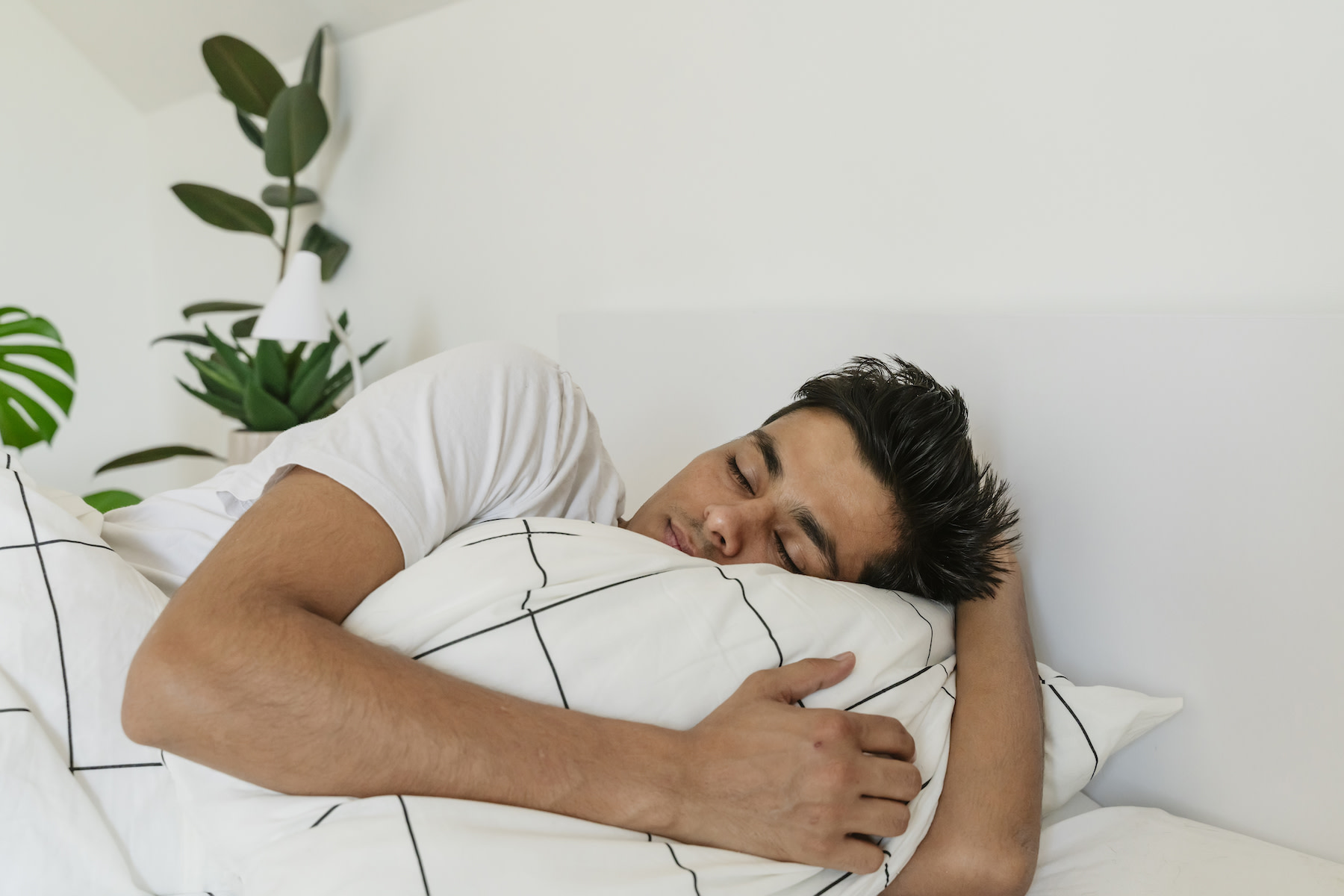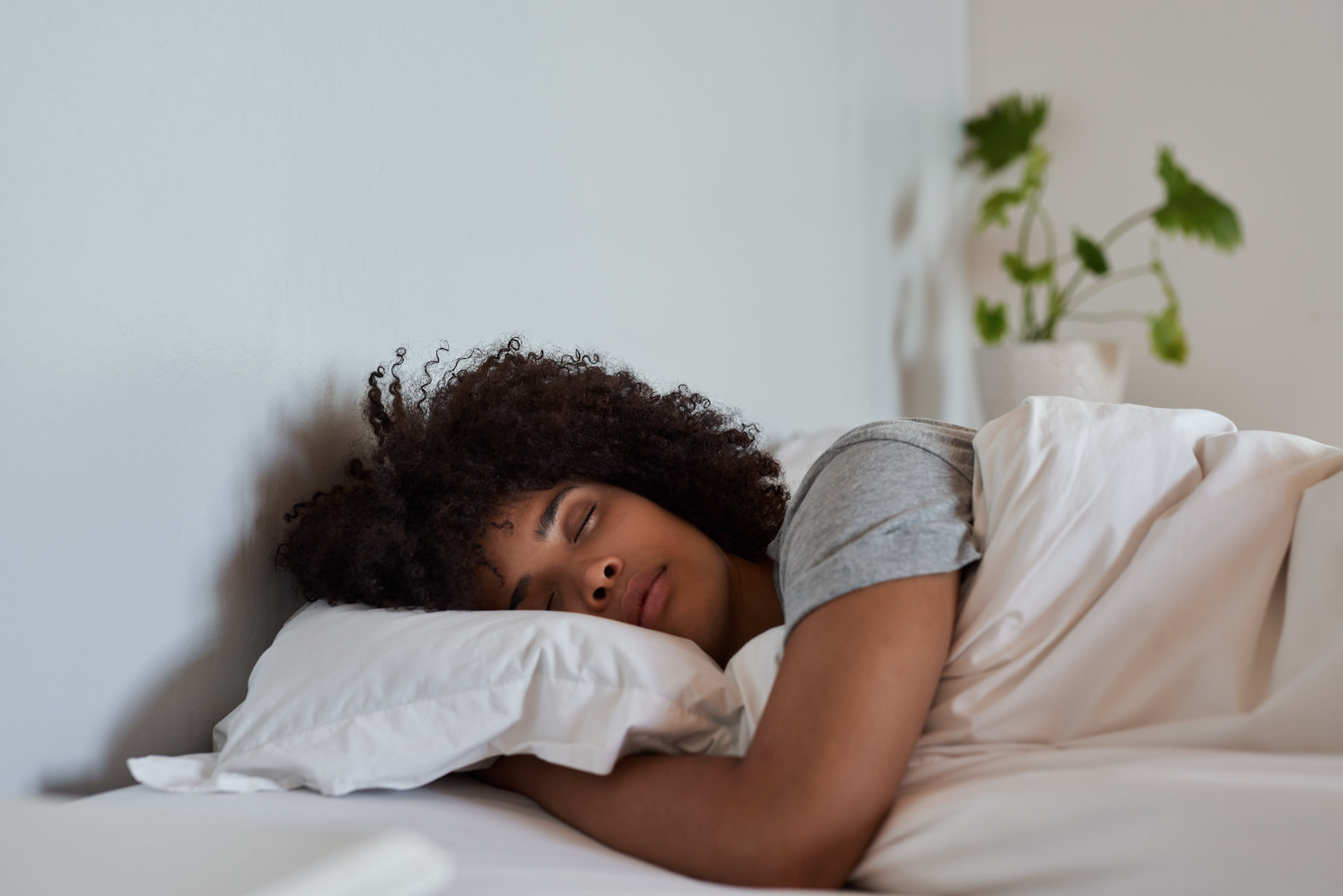
Westend61 / Westend61 via Getty Images
Great News: Experts Say It’s OK to Sleep in on the Weekend (a Little Bit)
If you’re not getting enough rest during the week, new research finds that an extra hour or two of Zzzs could be helpful.
By L'Oreal Thompson Payton•
Why Sleeping in on Weekends May Not Be a Bad Thing
How Long Should You Sleep in on Weekends?
Can You Actually Make up for Lost Sleep on the Weekends?
How to Stop Oversleeping on Weekends
Tips for Healthy Sleeping During the Weekend
The Takeaway
If you’re among the more than 100 million US adults who don't get enough sleep, chances are you’re pressing snooze come Saturday morning (if you even set an alarm in the first place). While we’ve been told it’s important to maintain a consistent sleep schedule every day, new research suggests that sleeping in an hour or two on the weekends may not be so bad after all.
Discover more ways to reach your goals with Peloton
For a long time, guidelines for healthy sleep behavior have largely focused on how long to sleep; however, a recent study from the National Sleep Foundation recognizes that other factors—such as sleep quality, sleep timing, and sleep regularity—are also important.
“Historically, we’ve always really cared about sleep duration, and we’re always telling people you need seven to nine hours of sleep if you’re an adult, and more than that for younger age groups,” explains Matthew D. Weaver, PhD, one of the study’s authors and an associate epidemiologist at Brigham and Women's Hospital in Boston. “And duration is only one component of sleep health. Other components that we’re increasingly viewing as important are regularity, satisfaction with your sleep, how alert you feel at any given time, and how efficient you are with your sleep.”
Below, check out what you need to know about sleeping in on the weekends and getting better rest overall.
Why Sleeping in on Weekends May Not Be a Bad Thing
Although going to sleep and waking up at relatively the same time each day is still the goal, Weaver says that if you’re not getting enough sleep during the week, getting an extra hour or two of Zzzs on the weekend could help your health. Specifically, that extra rest may help improve mental health, metabolic outcomes, cardiovascular outcomes, and inflammation levels, Weaver says.
“We’re telling people you need to be more regular, but there is a substantial portion of the population who aren’t getting enough sleep, and it does seem helpful to compromise regularity by extending sleep on the weekend in that group,” Weaver says. Basically, if you’re operating on sleep debt, research suggests that it’s helpful to catch up on some of that missed rest for an extra hour or two on the weekends, rather than skimping on your sleep solely to maintain a perfectly consistent schedule.
How Long Should You Sleep in on Weekends?
Sleeping in longer than an hour or two does come with some consequences. Research from 2017 found that women who slept in for two or more hours on the weekend were at increased risk of poor cardiovascular health. Additionally, waking up well after sunrise on a non-work day would result in less morning light exposure, which can negatively impact your circadian rhythm and lead to difficulty waking up early once Monday rolls back around.
“If you’re sleeping six hours during the week and extend your sleep by one to two hours on the weekend, those [sleep] profiles get better,” Weaver reiterates. But “there’s no evidence to support going beyond two hours on the weekend, and that’s probably because you can’t just pay back all of your sleep debt in one day or one weekend.”
Can You Actually Make up for Lost Sleep on the Weekends?
While it may not be possible to repay your sleep debt in full overnight or over the course of a weekend, sleeping in on non-work days or taking naps can help offset some of the damage caused by not getting enough rest.
“Acute sleep deprivation can be made up by sleeping in an extra hour on the weekend or going to bed an hour earlier than your usual bedtime,” Shelby Harris, PsyD, previously told The Output. “This can ‘pay back’ a small amount of sleep debt caused by a few nights of bad sleep, but it is not a long-term solution for a large amount of sleep debt.”

Mavocado / Moment via Getty Images
How to Stop Oversleeping on Weekends
If you’re prone to oversleeping on the weekends, experts recommend creating and following a consistent bedtime routine throughout the week. Here are a few pro tips to make that happen:
1. Adopt a Wind-Down Routine
Help prepare your mind and body for sleep with activities that calm you. Those might look like:
Reading a print book
Listening to a guided meditation, audio book, or calming music
Taking a bath
Doing restorative yoga
Journaling
2. Allot Enough Time for Your Nightly Routine
Think of bedtime as the time you crawl under the covers to go to sleep—not the time you start your nightly routine. “If I know that I need eight hours of sleep to feel well rested, that means I need to start a wind-down routine 45 minutes before I actually want to get in bed,” Weaver says. “It’s common to say, ‘I have to get to bed by 10:30,’ and then you’re up doing something until 10:30. It’s important to have a relaxing, standardized routine that you do each night.”
3. Limit Electronic Devices Before Bedtime
We know it’s easier said than done, but before bedtime, try to avoid exposure to blue light from technological devices, which can negatively impact the production of melatonin (aka the hormone that impacts the timing of your circadian rhythm). If you want to kick your bedtime routine up a notch, Weaver recommends removing TVs, phones, and other electronic devices from your bedroom. Speaking of…
4. Create a Sleep-Friendly Environment
Keep your bedroom quiet, dark, and cool to help send you off to dreamland. The ideal sleeping temperature can vary depending on your age, personal preferences, and who you ask. Some experts recommend keeping it between 60–69 degrees Fahrenheit, while others say temperatures in the low- to mid-70s are fine, too. Ultimately, you want to make sure your sleep environment feels cool and comfortable for you.
Other items you may want to consider to help you fall asleep (and stay asleep) are eye masks, ear plugs, a sound machine, and blackout curtains.
5. Consider Tracking Your Zzzs
If you’re curious about how much you’re actually sleeping, Weaver suggests keeping a sleep journal or using a sleep tracker. “Tracking your sleep and reflecting on how you feel can be very helpful,” he says. “Overall, being aware of your sleep and how it affects your life is good, but if you have a predisposition to worrying or a lot of anxiety about your sleep, it may not be so helpful.”
6. Finally, Don’t Worry About Oversleeping Too Much
It’s OK if your weekend snoozing isn’t an exact science. “We don’t think it’s possible to sleep more than you need, which is kind of unique with respect to sleep,” Weaver says.
For example, if you were to take a sleep vacation (sounds dreamy) for two weeks and sleep as much as you can, Weaver estimates that most people would sleep roughly 10 hours the first night; then their sleep would decrease to eight hours, and then seven over the course of their trip. “Your body would regulate and you would eventually arrive at the amount of sleep that you need,” Weaver says.
Tips for Healthy Sleeping During the Weekend
Beyond creating and following a sustainable, consistent bedtime routine throughout the week, here are a few more tips for gaining some solid Zzzs on the weekend without too much sleeping in:
Getting adequate light exposure first thing in the morning (and avoiding exposure to bright lights in the evening)
Avoiding large meals and alcohol before bed
Cutting off caffeine after 2 PM
Exercising during the day
“Exercise is great for sleep in general,” Weaver says. “You want to make sure you have time after the workout to wind down. As long as you’re not working out right up until the time that you go to bed, it’s definitely a net positive.”
The Takeaway
Although it may be tempting to sleep until noon on days when you don’t have to clock in, try limiting yourself to one to two extra hours of Zzzs and work to get back on a regular sleep schedule as soon as you can. “I think you’ll find that if you keep a regular sleep schedule, eventually you won’t need an alarm clock,” Weaver says. “You’ll wake up at the same time every day. But you have to be really intentional about your bedtime and your nightly routine.”
Weaver is optimistic that encouraging people to sleep in on the weekends when needed may help boost sleep health overall. “Sleep impacts all aspects of your life—it affects your mood, your ability to communicate, learn, and retain information. It’s even been linked to healthy aging,” he says. “So when we think about our life and what makes us happy, sleep is a critical component of that alongside diet and exercise. It’s the third pillar of health.”

Peloton App
Access thousands of classes with no equipment needed.
This content is for informational and educational purposes only and does not constitute individualized advice. It is not intended to replace professional medical evaluation, diagnosis, or treatment. Seek the advice of your physician for questions you may have regarding your health or a medical condition. If you are having a medical emergency, call your physician or 911 immediately.
This content is for informational and educational purposes only and does not constitute individualized advice. It is not intended to replace professional medical evaluation, diagnosis, or treatment. Seek the advice of your physician for questions you may have regarding your health or a medical condition. If you are having a medical emergency, call your physician or 911 immediately.
Level up your inbox.
Subscribe for a weekly dose of fitness, plus the latest promos, launches, and events.
By providing your email address, you agree to receive marketing communications from Peloton.
For more about how we use your information, see our Privacy Policy.








